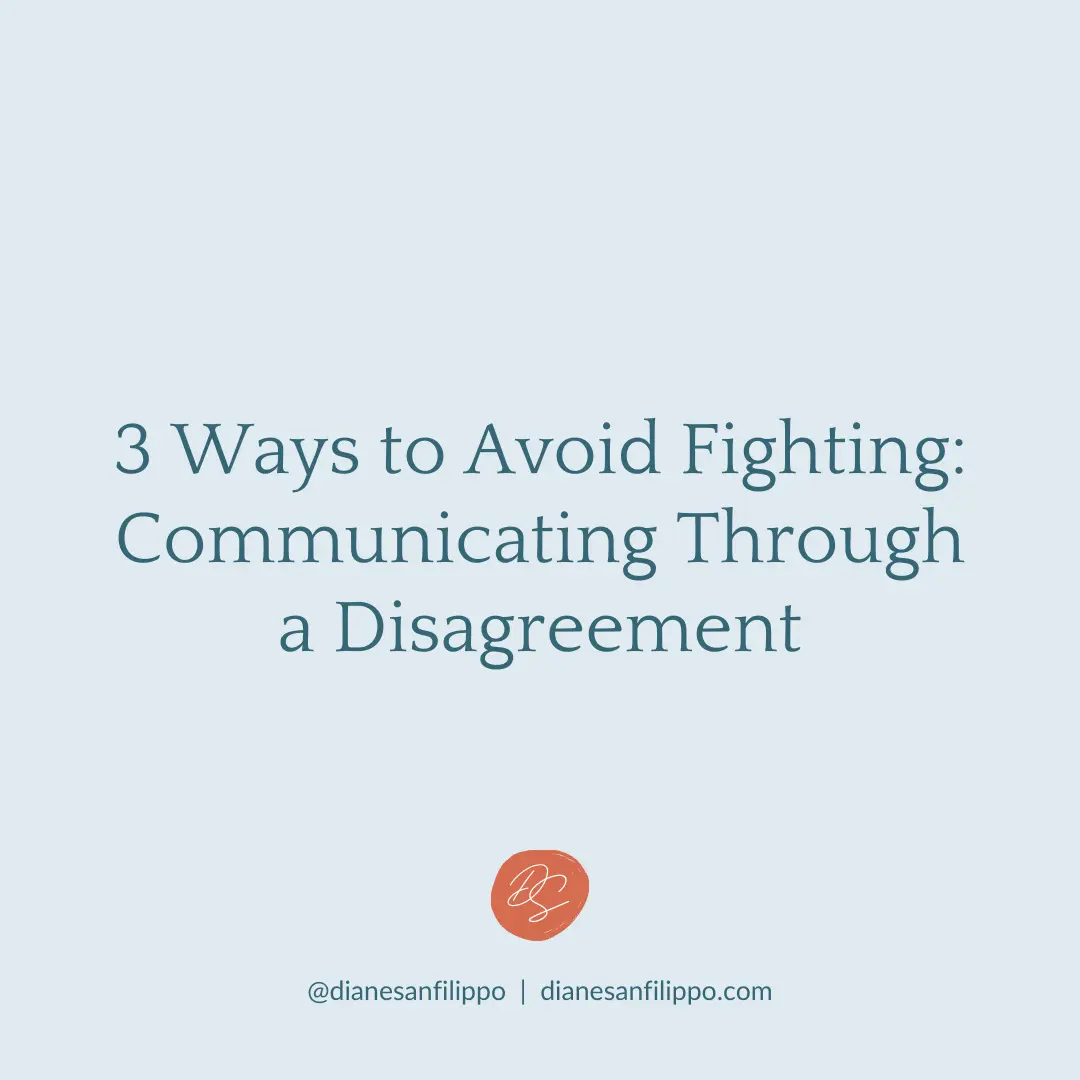
3 Ways to Avoid Fighting: Communicating Through a Disagreement.
I have a handful of insights on this idea wanting to avoid fighting. I consider this more like communicating through a disagreement, since that’s what fighting really is, isn’t it?
When emotions are running high, however, and we can feel on the defensive because we’re disagreeing, we can feel like we need to “fight.” I think considering this a time to communicate, instead, is a better approach.
I thought about this in the shower (where I have most of my epiphanies or good ideas, you?) after a recent disagreement with a family member. The lesson transcends our specific interaction, so I want to share what I learned with you.
Communicating through a disagreement leads to understanding and a better relationship.
Whoa. Read that again.
The thing is, we aren’t all always ready or willing to communicate (aka: talk about it) when we are feeling heated.
Since I’m confrontational by nature, I personally tend to attempt to nip the thing in the bud as quickly as possible – defuse the bomb, as I like to call it.
This won’t work with everyone (some people just need time to “cool off” before talking through something calmly), and sometimes you simply don’t have the luxury of time to spare before you have the conversation (perhaps you’re not face to face with this person often).
So, here’s what I learned in this recent interaction and in past interactions of a similar nature…
Disagreements (call them arguments, if you’d prefer) primarily happen due to:
- unmet expectations (likely because they were not communicated, but possibly because they were not agreed upon or not given context or rationale),
- mismatched values (hopefully you’re surrounding yourself with people who value what you do, but it isn’t always the case), or
- lack of accountability (someone or both of you don’t want to take ownership for your part in the matter).
Now, let me open up each of those reasons briefly, from my point of view.
Unmet expectations.
This is a big topic and I can only touch on it here, but I have seen this blow up many times in many ways.
Here’s one example from my own life: My husband is very punctual. If he says he wants to leave in the morning for a road trip at 8am, he’s ready by 8am, no question. Me? Well, I’m a little less strict about things like that, since, after all, aside from perhaps beating traffic, the time we selected to leave was, for the most part, arbitrary.
Going back to our 4-Tendencies types, he is an Upholder, which means he does both what others expect of him and what he expect of himself. And I am a Rebel, which means I can do whatever I choose to do, as long as it fits my self-concept. Luckily for me, my self-concept is of a punctual person when it matters to be on-time, and a loving, supportive spouse who doesn’t want to cause unnecessary upset with my dilly dallying (wink).
Several years ago, the day we embarked on our big cross-country (NJ > CA) drive, were slated to leave pretty early, and I was running maybe an hour behind for who-knows-what reason.
My husband spent a lot of the day annoyed about it but didn’t mention it until much later into the evening when I asked why he seemed annoyed (I told you, I’m confrontational). He said he had wanted to leave earlier than we did, and it meant we were (he was) driving later than he wanted to, and it was getting dark and this was putting him in a bad spot, so it (understandably) bothered him.
As a result of this discussion, we now have chats the night before any early road trip to set expectations very clearly. We usually come up with an agreed upon time to leave, with reasons why that time is important to meet (whether it’s so he isn’t driving too late, we arrive somewhere at a certain time, we are beating traffic if possible, etc.), and that’s that.
We both agree now that this hasn’t been an issue since that first time.
Unmet Expectations Lesson:
Don’t sweep it under the rug – whatever it is – and set very clear expectations upon which you both agree! Talk about the unmet expectation (and whether or not it was clearly communicated and agreed upon) as soon as you both are calm enough to, or sooner if time is a pressure and you won’t be face to face by the time you’re both calm. Just be prepared to withstand a hard conversation.
No good, deeply meaningful relationship perpetuates without at least some hard conversations. Look, you’ll still slip on meeting some expectations sometimes, but if you know that you’re both on the same team, not one against the other, you’ll be able to resolve the issues far more easily.
Mismatched values.
What does this look like in everyday life? When you’re planning a trip, or an evening or a meal out, or maybe even grocery shopping or chores, disagreements can pop up.
If you and your partner, friend, or loved one have a mismatched set of values, these activities (some of which are part of everyday life, of course!), will be so. Much. Harder. And lead to So. Many. More. Disagreements.
For starters, do your best to plan trips and meals out (and, I don’t know, spend the rest of your life) with someone whose values align with yours. Even if your spouse isn’t into eating Paleo or Keto or however you do specifically, if you are married to someone for whom general overall health isn’t a priority/value, this will be a challenge in your life on a daily basis.
What if you got married before this was so important to you?
Time for a hard conversation about the support you want and need – and expect and deserve. If you’re afraid to create boundaries or lay down some house-rules with your spouse, what does that say about the relationship to which you’re committed? You don’t need to be eating the exact same food, but a level of respect is fair – as in, they don’t bring junk into the house if you struggle to avoid it and know that it makes you feel ill.
What else to do?
Avoid putting yourself in situations where you are constantly being questioned or challenged about your values – and I’m talking about your healthy, growth-oriented ones. If the friends you once kept enjoy going out and drinking every weekend, but you no longer do, you don’t need to continue spending every weekend with them. Instead of arguing about what to do, or ending up name-calling or getting heated over their behavior or them bugging you about not drinking, just opt-out.
Mismatched Values Lesson:
You don’t need to maintain relationships as closely that no longer align with your values. And, if you and your spouse don’t seem to have aligned values, it’s time for some hard conversations about the support and respect you want and deserve – perhaps in therapy if having this type of candid conversation is a bit new to you.
Lack of accountability.
This one is hard. We typically don’t want to own that we were wrong, or did something wrong one time (wink), or that we did, in fact, hurt someone when we didn’t intend to.
In a recent conversation I had with a family member, I said something that was both true for me and also, at the very same time, painful for her to hear. I wasn’t a personal attack, nor was it intended to hurt her. But, for a moment, it did upset her.
She got up from the table we were sitting at, and took a few minutes to go to the bathroom and just sort of shake it off.
Now, we could have “just let it go,” but I knew what had just happened. I knew that I said something that upset her, and that she walked away from it. I needed to be accountable for not only what I said, but for the truth of why I said it.
And, in my true fashion, I identified what happened and what was about to happen (we’d just ignore it and carry on), and asked that we, instead, address it. She wasn’t sure if she wanted to in that moment, but we didn’t have much time so I didn’t want to let it go. I really wanted to clear the air (the opposite of sweeping it under the rug, if you’ve been reading all of this).
We both expressed what happened from our respective points of view, and since I was the one to trigger the upset, I took accountability for what I said and the way I said it. I knew that the way that I said things leading to the upset landed poorly, and though clearly it wasn’t my intent, it hurt her in the moment and I needed own it and apologize for it.
We continued to talk about what had gone on in the exchange, and she better understood my intent, my emotions around what I said (essentially the “full story” of what I really meant, I suppose, but that I don’t always readily express because FEELINGS HELLO), and got to know me better as a result. It was surprising to me that there was (gasp) subtext to what I had expressed to her — that I meant something even deeper than what I said in words initially. But, whew! Digging that up helped a lot!
Imagine that. When I expressed how I really felt, and was vulnerable with someone who I know cares about me, we were able to become even closer.
Accountability Lesson:
Deeply communicating around a disagreement leads to a better relationship. This requires a lot of trust, and honesty as well. You’ve got to be willing to bear yourself, but, in the end, aren’t your loved ones worth that? If you’ve got a close friend, family member, or spouse/partner who matters to you, isn’t honesty just about the most important thing to forming a solid, trusting relationship?
Those are my thoughts for today.
See, I told you it was going to get deeper in these emails. I needed a place, a way, to share the kind of things I think about with those of you who are truly here for it, ya know?
I appreciate you, and that you took the time to read this, I mean that.
xo,
D



Victoria says:
Diane, I loved these thought-provoking posts. This is something I see so many of my friends struggle with when it comes to their significant others. Communication w/my spouse has always been #1 and I think we have been able to “clear the air” more times than not by following a similar approach. Thanks, for breaking this down for us! I loved this post.
Diane Sanfilippo says:
YES! Clear the air quickly, don’t sweep under the rug!♥️